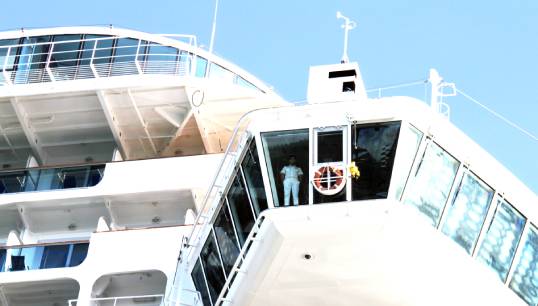- Topics
- Campaigning
- Careers
- Colleges
- Community
- Education and training
- Environment
- Equality
- Federation
- General secretary message
- Government
- Health and safety
- History
- Industrial
- International
- Law
- Members at work
- Nautilus news
- Nautilus partnerships
- Netherlands
- Open days
- Opinion
- Organising
- Podcasts from Nautilus
- Sponsored content
- Switzerland
- Technology
- Ukraine
- United Kingdom
- Welfare

Another interesting and informative session of the Nautilus Professional and Technical Forum was held in October, which once again demonstrated the value of getting members together on a regular basis to share their views and expertise on important maritime matters.
Held online, the meeting saw a great turnout of members and was also attended by invited experts such as Peter van der Kruit of the Dutch Shipmasters' Association (NVKK), and Commodore Jim Scorer, secretary general of the International Association of Shipmasters' Associations (IFSMA).

The main topic of the meeting was the authority of the shipmaster – a topic brought to the forefront by the findings of two recently published accident investigation reports.
The first was the Eemslift Hendrika, which had to be abandoned after cargo had shifted in heavy seas. In their report, the Dutch accident investigation branch came to the conclusion that the accident was at least partly caused by the company not having authority to over-ride the master and issued a recommendation that where the safety of the crew or ship could be compromised, that the company could impose instructions on the master.
The case of the Khota Bahagia was also presented. In this case the accident investigation had found that following a fire onboard, the shoreside authorities had overridden the initial advice of the master which worsened the consequences of the incident. The report therefore emphasised the importance of respecting the overriding authority of the shipmaster as enshrined in international law.
In the ensuing discussion members and guest experts were clear that they disagreed with the findings of the report in to the Eemslift Hendrika and emphasised the importance of respecting the master's overriding authority. Many members were of the opinion that the authority of the master has been eroded in recent years by interference from ashore whilst the level of responsibility and the risk of criminalisation has increased.
It was also pointed out that there has yet to be any meaningful discussion on the role of the master and criminal liability in relation to remote control or fully autonomous ships.
The expertise and feedback provided to us by the P&T Forum is invaluable to us and helps us to ensure we are able to address the issues that are of the most importance to our members wherever we represent them.
Please join us at one of our forum meetings in the new year, when we are hoping that at least one of our three meetings will be hybrid, offering the options of in-person or online attendance. We'll advertise the dates nearer the time, and all members will receive an email invitation as usual.
Get Involved
The UK Maritime & Coastguard Agency is running a consultation on revisions to the Workboat Code, looking particularly at introducing new provisions for the remotely-operated vessels that now operate in the workboat sector. The revisions will also seek to clarify survey and certification requirements and responsibilities for workboats and pilot boats. To take part in the consultation, go to www.gov.uk and search for workboat consultation. The deadline is 29 December 2022.
The master's authority: what members said
Nautilus members at the October 2022 Professional and Technical Forum showed their usual rigour when debating the issue of the master's authority. Here is a taste of the comments in the discussion.
'The master's authority is enshrined in law. This Dutch case [Eemslift Hendrika] can't override that.'
'Technology makes it inevitable that some responsibility will be moving ashore, though, so we need to have better experience there.'
'My feeling is that if the master is always going to take the blame, then they should have the responsibility.'
'It would be helpful if accident investigations like the Eemslift Hendrika could tease out why the master acted as he did.'
'Rather than trying to take over, shore teams should be more useful in supporting the master with helpful information you haven't got onboard.'
'You can't rule by committee at sea. Yes, have checks and balances, but someone has to be in charge.'
'As usual, what a lot of this comes down to is improving relations between ship and shore.'
'There's a difference between the master being in charge and the master being right.'
'Can a master be held criminally responsible for a decision taken in partnership with shore?'
'I remember being questioned from shore when they couldn't see why we were trying to avoid bad weather. I think technology is helpful as evidence for why a decision was made.'
'I just don't think anyone will step up and take responsibility ashore. They'll fall back on the established infrastructure.'
Tags
